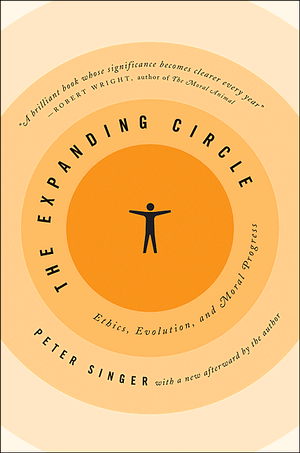The well-known bioethicist Peter Singer mooted the concept of the “expanding circle” in 1981 with his book The Expanding Circle: Ethics, Evolution, and Moral Progress (the link also has an embedded Bloggingheads conversation between Singer and Robert Wright discussing the book and the idea). Although the term “expanding circle” hasn’t exactly become a household term (it doesn’t even have a Wikipedia article yet) the idea does seem to have gained a lot of currency and is expressed in different forms. Possibly, many people have rediscovered the idea without even being aware of Singer’s original formulation. In this blog post, I’m going to address the idea as it appears in many common discussions, and not necessarily Singer’s original formulation. (To be honest, I haven’t read Singer’s book, so I couldn’t critique Singer’s original formulation accurately anyway).

Book cover of The Expanding Circle: Ethics, Evolution, and Moral Progress, Princeton University Press
The “expanding circle” idea relates three things:
- The changes in people’s circle of moral concern over time.
- A notion of larger versus smaller circles of moral concern, i.e., a way of meaningfully saying that a certain circle of moral concern is larger than another.
- The normative ethics of whether larger or smaller circles of moral concern are better.
The strong version of the “expanding circle” idea makes three claims:
- Relating (1) and (2) (empirical): People’s circle of moral concern has expanded over time, and this trend is likely to continue
- Relating (2) and (3) (normative): Expanded circles of moral concern are generally better.
- Relating (1) and (3) (normative): In general, people’s morality improves over time.
To some extent, if we believe in two of these three claims, the third automatically follows.
It’s tempting for optimistic open borders advocates to make a case for open borders based on the expanding circle. The obvious idea is that open borders would be a lot more appealing to people whose circle of moral concern includes foreigners at nearly the same strength as natives. Restrictionists typically argue their case using a combination of citizenism and territorialism, which correspond to a narrower circle of moral concern (put differently, it puts a substantially higher weight on the interests and rights of one subset of humanity compared to another). Optimistic open borders advocates may therefore make three related claims:
- Relating (1) and (2): Open borders advocates would like to argue that people’s circle of moral concern will grow to include non-citizens and those who live far away.
- Relating (2) and (3): Open borders advocates would like to argue that, generally speaking, an expanded circle of moral concern, that does not weigh the interests and rights of citizens/native residents too much higher than the interests and rights of non-citizens/non-residents, is objectively better.
- Relating (1) and (3): Open borders advocates would like to argue that the future will be more favorable to open borders than the present is.
The three claims are linked (and any two imply the third, to an extent). My co-blogger John Lee’s first blog post borrowed its title from Martin Luther King Jr.: “The arc of the moral universe is long, but it bends towards justice” and is a fine example of the expanding circle argument.
A pessimistic open borders advocate may still view (2) and (3) as related, but be pessimistic about whether the trajectory of moral progress will move the world closer to open borders. An empirically agnostic open borders advocates may also view (2) and (3) as related but be agnostic about what the future has in store.
More on the circles and their applicability to open borders
A distinction can be made between two kinds of circles of moral concern: people (or more generally, sentient beings) to whom you feel an obligation of non-aggression (i.e., beings that are perceived to have moral rights) and people to whom you feel positive obligations to directly help. This distinction is very important for libertarians, who generally believe that most obligations to strangers are in the form of an obligation of non-aggression rather than an affirmative action. Thus, libertarians generally view the killing versus letting die (act/omission distinction) as morally significant. As Robin Hanson has pointed out, libertarians may have narrower circles of people to whom they feel positive obligations, but larger circles of people to whom they feel an obligation of non-aggression.
There is an important intermediate case: who are the people for whom you feel you have a positive obligation to expend resources to stop others from violating their rights? With the language of “killing versus letting die” this comes in the “letting be killed” category — a category that seems to be intermediate (I’d like to thank Andy Hallman for raising this question). On a certain view, immigration restrictions involve the use of aggression and coercion, but to argue that individuals are morally obligated to advocate for open borders would require making an argument that they view foreigners as part of the sphere of moral concern that deserves a positive expenditure of resources towards a non-violation of rights.
Another circle that might be of interest is the circle of people, or sentient beings, towards whom we feel a requirement to be honest and contractually fair. Generally speaking, it is considered okay to use deceit or trickery against animals, even if actually torturing those same animals was considered wrong. However, in general, the use of deceit or tricks against humans is frowned upon, with possible exceptions being made for infants, people who are violent and unstable, and people with some special and severe cognitive problems.
All these circles are relevant in different ways to different framings of the case for open borders. Continue reading The expanding circle and open borders
